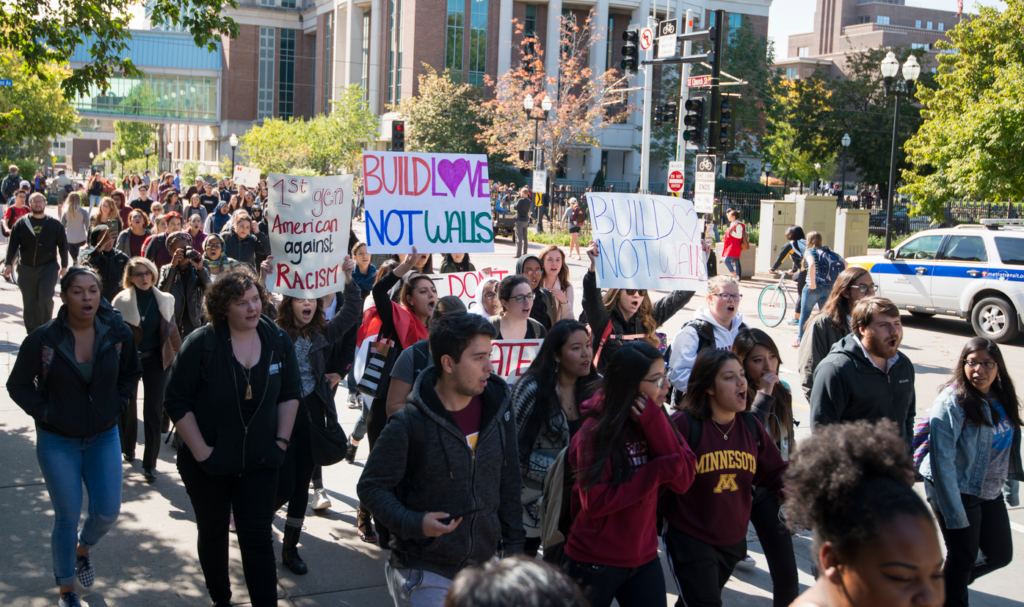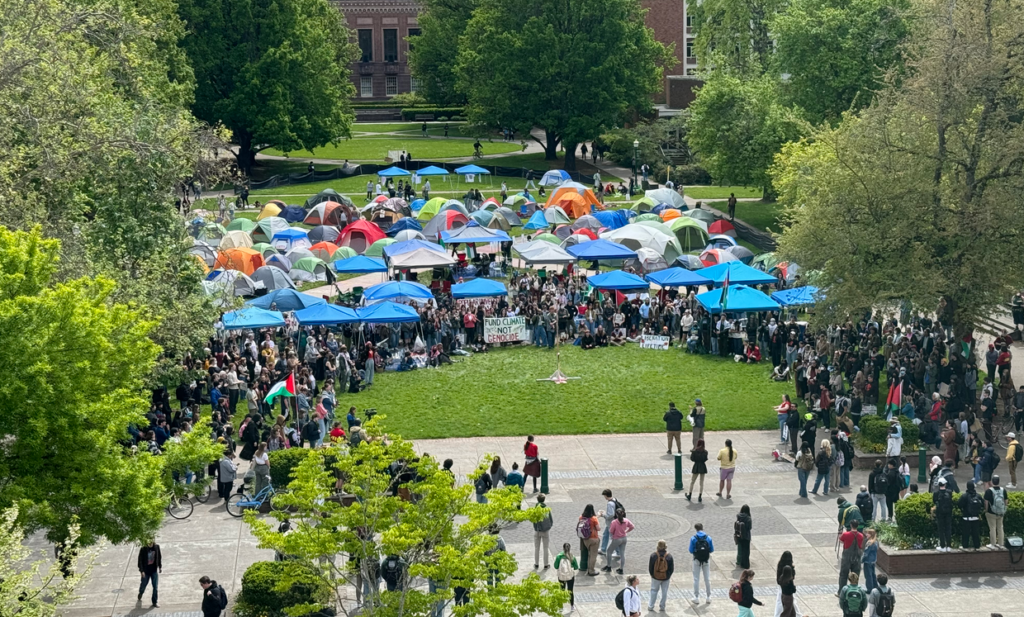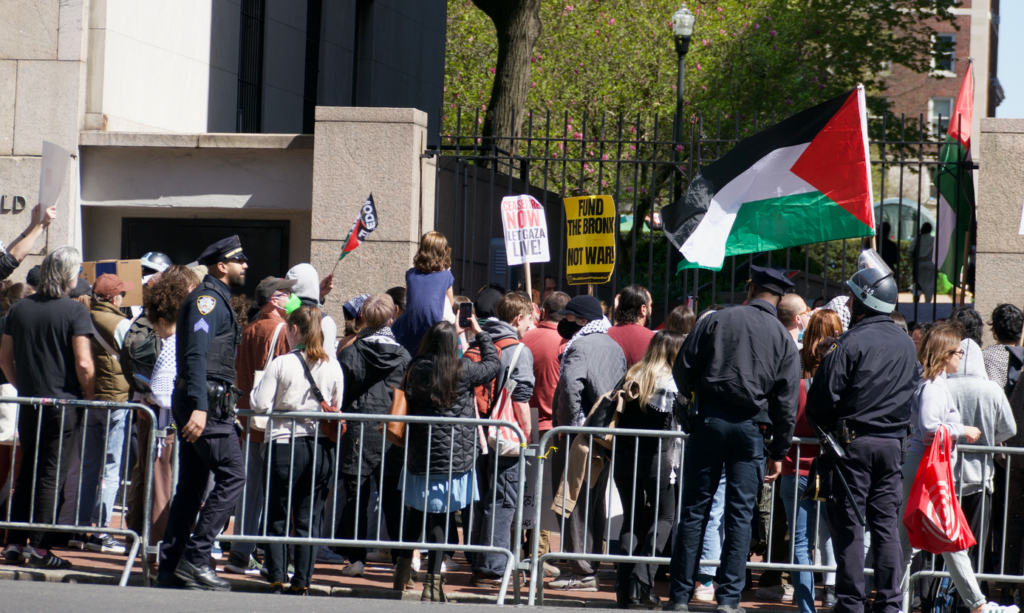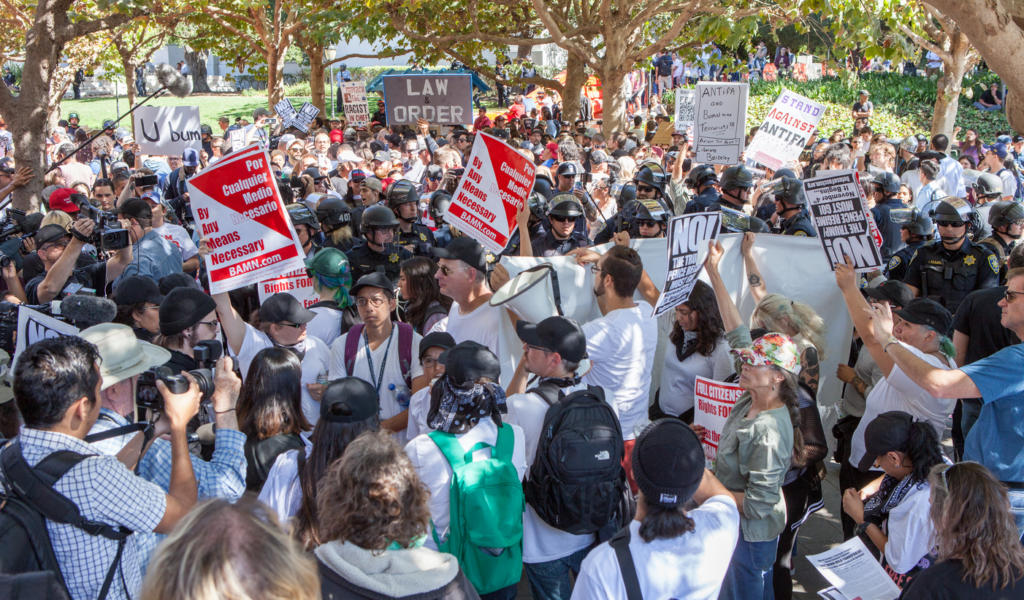By Dr. Tom H. Hastings
Photos: Wikimedia Commons
In my town, I am periodically confronted by activists who wreck stuff, throw things at cops, smash windows, and claim to be strategic and effective.

Yeah, no.
What they cite as evidence is, “Well, here we are, months later, and we are still talking about it. That’s effective.”
Um, sorry. Virtually all the talk revolves around “Geez, that was horrible. How do we prevent anything like this happening again?”
That is not effective.
Organizers of protests should ask themselves at virtually every decision point: how will this affect recruitment to either our numbers of supporters and allies or our direct participants or both?
This exact thing happened on the campus where I teach, and the results have been instructive. Students began to act to demand that the university stop any relationship with Boeing, since Boeing is a war contractor supplying Israel and Israel has been slaughtering children in the name of self-defense.
Good for you, students. All colleges and universities should figure out how to stop supporting any murderous regime, from Russia to Israel to Venezuela to Iran to Sudan and on. What are the investments made by the Boards of Trustees? This business should be transparent so students can make reasonable decisions about trying to influence their school.
The odd piece where I teach is that the university bought nothing from, invested nothing in, Boeing. Instead, Boeing donated to my university. Students demanded that this stop.
The university president almost immediately agreed to pause on accepting anything from Boeing and study the situation.

At Brown University, students heard their president make similar concessions in late April, 2024, and broke down their camp.
Not at my university. The students, quickly joined by many more non-students, began by taking over space for themselves that had previously been public, denying their fellow students access to spaces previously available to all. They defaced the outside of the campus library with messages that many Jews found tantamount to calls for genocide, e.g., “From the river to the sea,” a slogan coined in the 1960s by the Palestinian Liberation Organization, reiterated in the original 1987 Hamas Charter, that framed it as “pushing the Jews into the sea,” a genocidal ideation that has never been taken as anything else by the parties most intimately involved–Palestinians and Israeli Jews.
The trauma of the Jewish Holocaust remains real and to inflame it with such sloganeering is certain to get a frightened and frightening response. That it’s not a trigger to young non-Jewish people today is simply a facet of their ignorance of history and has been a cruel bit of language meant by some to inflict the pain that it has.
There seems to be great sensitivity to the trauma on Palestinians of the founding of the state of Israel amongst activists. This one-sided trauma-awareness is strange.
What I ask my students is, “OK, if a Black person asked you to stop calling him ‘Boy,’ would you do so? The use of phrases with historical baggage such as ‘from the river to the sea’ is analogous to that.” I may mean no harm to that Black man when I say, ‘Oh, boy, you are really talented,’ but once a Black man mentions that some Black men may be offended by that language, I stop, and I wonder about those who continue to use slogans with genocidal connotations, such “From the river to the sea.”
The protesters began by commandeering previously public space and denying it to others, then, after non-students–often in their 30s and 40s, even in their 60s–joined and took over, they went into the university library and shut it down, denied it to all others, spraypainting messages of hate, breaking fire doors and a great deal else, with a repair bill originally guessimated at $750,000, then three weeks later thought to perhaps be around $825,000 or more, now more than $1.23 million as deeper damages were discovered and repaired.

Of the 30 arrested, just six were students. This was a hijacked protest.
Interestingly, police let them know the morning they intended to come in to clear it out, and let them know a back door was open for a period, during which dozens fled. This raises questions about the possibility of agents provocateurs who committed the most egregious actions and egged on others–the history of such undercover agents is that they do not want their covers “blown,” of course. Did one or more such agents escape arrest and possible identification by the tactic of allowing some to flee without consequence?
In Ireland, students began an encampment demanding that Trinity College Dublin divest from Israel. Negotiations ensued and the college agreed to student demands on an incremental basis, at which point students broke camp.
Some universities, such as Rutgers, used a carrot and stick approach that agreed to some student demands, not necessarily all, but agreed to continue dialog–but also threatening arrest at some point if students continued to stage a takeover of campus space that rightly should be accessible to all. At Rutgers and some others of those cases, students took their victories, broke camp, and vowed to continue dialog with a potential to again engage in nonviolent resistance if no progress ensued.
This is basic Negotiation 101. Make a demand. Let the other party know what your best alternative to a negotiated agreement (BATNA) is. Stick to it and impose costs if you are able. Do so without rancor or identity slurs, which saves face for everyone. Preserving everyone’s dignity in the throes of conflict is crucial and ultimately allows your enemy to become your opponent and ultimately your partner in a collaborative path forward.
Or you can “f__k sh_t up,” disrupt for the sake of disrupting, and call yourself strategic. You will create lifetime enemies and you will lose heavily in public opinion, but if you can achieve the catharsis you so clearly crave, I am sure it’s worth it to you. Yeah, we will talk about you into the future, which is apparently your benchmark of “effectiveness.” Just don’t expect much approbation and especially do not expect to save a single Gazan life, instead contributing to the public apathy or even opposition to peace.
Nice going.

Dr. Tom H. Hastings is Coördinator of Conflict Resolution BA/BS degree programs and certificates at Portland State University.







